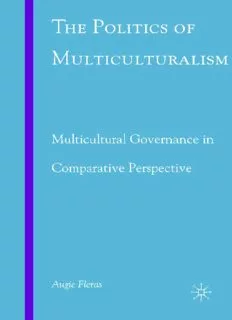Table Of ContentThe Politics of
Multiculturalism
July16,2009 19:9 MAC-US/FLER Page-i 0230604544ts01
This page intentionally left blank
The Politics of
Multiculturalism
Multicultural Governance in
Comparative Perspective
Augie Fleras
July16,2009 19:9 MAC-US/FLER Page-iii 0230604544ts01
THEPOLITICSOFMULTICULTURALISM
Copyright©AugieFleras,2009.
Allrightsreserved.
Firstpublishedin2009byPALGRAVEMACMILLAN®inthe
UnitedStates-adivisionofSt.Martin’sPressLLC,175FifthAvenue,
NewYork,NY10010.
WherethisbookisdistributedintheUK,Europeandtherestof
theworld,thisisbyPalgraveMacmillan,adivisionofMacmillan
PublishersLimited,registeredinEngland,companynumber785998,
ofHoundmills,Basingstoke,HampshireRG216XS.
PalgraveMacmillanistheglobalacademicimprintoftheabove
companiesandhascompaniesandrepresentativesthroughouttheworld.
Palgrave®andMacmillan®areregisteredtrademarksintheUnited
States,theUnitedKingdom,Europeandothercountries.
ISBN:978–0–230–60454–4
LibraryofCongressCataloging-in-PublicationData
Fleras,Augie,1947–
Thepoliticsofmulticulturalism:multiculturalgovernance
incomparativeperspective/AugieFleras.
p. cm.
Includesbibliographicalreferencesandindex.
ISBN-13:978–0–230–60454–4(alk.paper)
ISBN-10:0–230–60454–4(alk.paper)
1. Multiculturalism—Politicalaspects—Cross-culturalstudies.
2. Ethnicity—Politicalaspects—Cross-culturalstudies.
3. Comparativegovernment. I. Title.
HM1271.F552009
320.08—dc22 2008055637
DesignbyIntegraSoftwareServices
Firstedition:September2009
10 9 8 7 6 5 4 3 2 1
PrintedintheUnitedStatesofAmerica
July16,2009 19:9 MAC-US/FLER Page-iv 0230604544ts01
Contents
Preface vii
1 MulticulturalismsasGovernance:PrinciplesandParadoxes,
PoliciesandPerspectives 1
2 TheorizingMulticulturalGovernances:MakingSociety
SafefromDifference,SafeforDifference 23
3 ManagingDifference,MakingaDifference:
MulticulturalismasInclusiveGovernanceinCanada 55
4 MulticulturalismsintheUnitedStates:Multicultural
Governances,AmericanStyle 89
5 Multiculturalisms“DownUnder”:Multicultural
GovernancesacrossAustralia 113
6 ContestingGovernancesinAotearoaNewZealand:
Monoculturalism,Biculturalism,Multiculturalism,and
Binationalism 129
7 DutchMulticulturalism:UnsettlingMulticultural
GovernanceintheNetherlands 147
8 MulticulturalisminBritain:ContestingMulticulturalisms,
EvolvingGovernances 165
9 ThePoliticsofMulticulturalPolitics:TransatlanticDivides,
IntercontinentalDiscourses 187
10 ReconstitutionalizingMulticulturalism:Governance
PathwaysfortheTwenty-firstCentury 203
Bibliography 225
Index 267
July16,2009 19:9 MAC-US/FLER Page-v 0230604544ts01
This page intentionally left blank
Preface
Theopticsarenotlookinggood.FromtheAmericastotheAntipodesby
wayoftheEuropeanUnion,acommitmenttomulticulturalismisunder-
going a harrowing decline. Having outworn its welcome and apparently
outlived its usefulness, multicultural models of governance are increas-
ingly maligned as a good idea gone bad or, alternatively, a wretchedly
defined project unfolding according to plan. Multiculturalism as gov-
ernance may have originated as a political project to advance national
interestsbydepoliticizingdifferences.Atpresent,however,thepoliticsof
governanceareshiftingtowardanti-multiculturalism,ifonlytoabortthe
drift into divisiveness or threat of extremism. Even in the country that
inventedit,Canada,multiculturalismissometimescriticizedasmushiness
or menace—little more than a bloated legacy from a cloyingly inter-
ventionist Trudeau era (Granastein 2007; Kay 2008). In short, a broadly
basednarrativecrisishasemerged—oftenwithoutmuchawarenessofthe
complex histories of ambivalence and incoherence that informed multi-
cultural projects—that criticizes multiculturalism as a failed experiment
withamisplacedemphasisondifferencesovercommonality,diversityover
cohesion,andseparationoversolidarity(LentinandTitley2009).
But before interring the corpse of multiculturalism, a few questions
are in order. If multiculturalism has outlived its usefulness, why was it
so useful in the first place? If multiculturalism is dying, what is it dying
of—rejection?flaws?indifference?backlash?expediency?misinformation?
improperdefinition?Ifmulticulturalismisnotworking,whosaysso,why,
onwhatgrounds,anduponwhosestandardsofsuccessorfailure(Lentin
and Titley 2009; Reitz 2009)? Or to paraphrase Hurriyet Babican (2006)
hasmulticulturalismfailedsocietyorhassocietyfailedmulticulturalprin-
ciples?Is multiculturalism floundering because of increasingly politicized
diversity,orbecausetheinterplayofglobalterrorismwiththepoliticization
offaith-basedminoritygroupsfostersanantimulticulturalism(Kymlicka
2005;Hage2006;Parekh2008)?Isitunfairlyscapegoatedbecauseofamis-
takentendencytoconflatemulticulturalismwiththesinsofimmigration
or the costs of integration failures, in addition to links with emotion-
allychargeddebatesoverculturalrelativism,internationalhumanrights,
July16,2009 19:9 MAC-US/FLER Page-vii 0230604544ts01
viii PREFACE
racism,accommodation,belonging,andcitizenship(Siddiqui2007)?And
ifnottheprinciplesandpracticesofmulticulturalismforthegovernance
of diversity and living together with difference, what then? It is within
this interrogative context of challenge and opportunity that The Politics
ofMulticulturalismjustifiesitsexcursionintotheundertheorizedrealmof
multiculturalgovernancealongcomparativelines.
Inthe“security-conscious”post-9/11and7/7era,thepoliticsofmul-
ticulturalism is contesting the legitimacy and logic of multicultural gov-
ernance, with some saying yes, others insisting on no, and still others
confused or indifferent. For some, a commitment to multiculturalism
constitutes an unmitigated recipe for disaster; for others, a blueprint for
success; and for yet others, a two-edged phenomenon with costs and/or
benefits depending on context or criteria. In looking to navigate around
these tricky shoals of the good versus the bad by way of the in-between,
ThePoliticsofMulticulturalismemploysacomparativeperspectivetoana-
lyze and assess the multicultural management of diversity and difference
inCanadaandtheUnitedStates,AustraliaandNewZealand,andBritain
andtheNetherlands(alsoPanossianetal.2007;KoeniganddeGuchteneire
2007).Attentionisfocusedonhowandwhyashifttowardmulticultural-
ismasgovernanceevolved—thendevolved—inmanyofthejurisdictions
understudy.Particularattentionfocusesonexplainingthepopularityand
persistenceofmulticulturalismasalong-terminvestmentinsomejurisdic-
tionsbutnotinothers.Inaddressingthesecontroversies,thebookgrapples
with a central dilemma regarding the future of multiculturalism: What
can be done to realign patterns of multicultural governance in ways that
promotethesocial(redistribution)withthecultural(recognition)without
imperilingthenational(integration)(alsoAsarietal.2008)?
The book’s main line of argument unfolds as follows: In contrast to
assimilationist or separatist templates of the past, an inclusive multicul-
turalgovernanceappearsbetterpositionedtoachievesocialcohesionand
economic integration, secure positive identities and meaningful citizen-
ship, and avoid ethnic strife (also Koenig 1999). This assertion—that an
inclusivemulticulturalgovernancecanenhancecooperativecoexistence—
reinforces the centrality of core topics in this book, including (1) the
relationofmulticulturalismtoamulticulturalgovernance;(2)conceptual
gapsbetweenmulticulturalideals(whatitpurportstodo)andgovernance
realities (what it really does); (3) how debates over difference are play-
ing politics with the principles and practice of multiculturalism; (4) the
rationalebehindpolitical/stateresponsestominorityclaims-makingactiv-
itiesforrespectingdifferenceandremovingdisadvantage(Triandafyllidou
etal.2006);and(5)theprospectsandpitfallsofimplementingamulticul-
tural governance. Admittedly, ensuing debates over the pros and cons of
July16,2009 19:9 MAC-US/FLER Page-viii 0230604544ts01
PREFACE ix
multiculturalismrarelyyieldaconsensusaboutpreferredmodelsofmulti-
culturalgovernance(Choudhry2007;KunzandSykes2008).Nevertheless,
a dearth of consensus in sorting through the yeas and the nays and the
maybesisnotentirelydetrimental.Suchopen-endednessnotonlyprovides
thecatalystforthiscomparativestudyofmulticulturalgovernance;italso
secures“wiggleroom”forexploringalternativegovernanceframeworksby
realigningcriticallyinformedresponseswithcontestedrealities.
Aimed at scholars as well as the nonspecialists, The Politics of Multi-
culturalismstrivestobescholarlywithoutbeingimpenetrable,descriptive
withoutabandoninganalysisandcomparison.Theobjectiveofthisbook
istwofold:(1)toestablishablueprintforanalyzingthepoliticsofmulti-
cultural governance along cross-national contexts and (2) to formulate a
theoreticalframeworkforconceptualizingthepoliticsofmulticulturalism
in establishing an inclusive governance. Three important caveats prevail
as well. First, this book addresses the politics of multiculturally man-
aging immigrant (or ethnic) difference in those wealthy societies where
constitutional primacy reflects the political norms of liberal democracy
andindividualrights(alsoModood2007).Acommitmenttomulticultur-
alism endorses varying governance initiatives in these domains, ranging
from immigration settlement to antiracist initiatives, from accommo-
dating collective rights claims to challenging the internal organization
and cultural neutrality of state institutions, from moves for advanc-
ing gender and sexual orientation equality to fostering a framework for
what Leeuwen (2008) calls everyday multiculturalism, including those
affective-dynamic aspects involving the daily rhythms of social life. To
the extent this book embraces a macro orientation (the “big picture”)
ratherthanamicroorientation(“street-levelmulticulturalism”),emphasis
isdrawntowardMulticulturalismwithacapitalMratherthanalower-case
multiculturalism.
Second, The Politics of Multiculturalism addresses the concerns of
migrants and minorities rather than the exclusionary politics of nation-
hood(McGarryandO’Leary2007).Withitsfocusoninstitutionalinclu-
siveness, the multicultural governanceof immigrants and descendants of
immigrantsprevailsoverthesovereigntypoliticsofnationalminoritiesor
indigenouspeoples.Therationaleforthisdistinctionisreadilydefended:
With the exception of New Zealand, where multicultural discourses are
inextricably conjoined with debates over biculturalism, the politics of
“isms”reflectsfoundationallydifferentdiscursiveframeworks(Maakaand
Fleras 2005). In conceding that different kinds of difference pose fun-
damentally diverse challenges and responses, in effect reinforcing those
governanceframeworksthatacknowledgedifferentwaysofacknowledging
differenceanddiversity,thisbookexploresthepoliticsofmulticulturalism
July16,2009 19:9 MAC-US/FLER Page-ix 0230604544ts01
Description:The politics of multiculturalism in the post 9/11-7/7 era have made it abundantly clear: Increasing diversity and its politicization as difference have sharpened the need for models of multiculturalism that make society safe from difference, yet safe for difference. In acknowledging the centrality o

